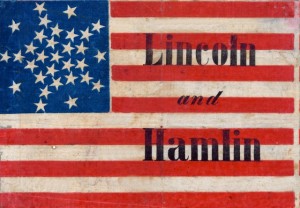 Republicans selected Abraham Lincoln as their candidate for the 1860 at their convention in Chicago, Illinois, but few newspaper editors had predicted that outcome in the months before the convention. One of the other prominent Republican politicians, such as New York Senator William Seward, seemed to be the more likely choice. While the Republican Milwaukee (WI) Sentinel admitted that “it was not yet clear who the Chicago nominee may be,” they believed that “the chances [were] decidedly in favor of Senator Seward.” The San Francisco (CA) Evening Bulletin had a similar opinion. “We have on previous occasions stated our well-settled conviction that Mr. Seward would certainly be the candidate,” as the Evening Bulletin concluded. The Democratic Raleigh (NC) Standard went so far as to explain that “Seward has in all probability been nominated” several days after the convention had actually selected Lincoln. Yet some editors had warned that selecting someone like Senator Seward would be a mistake.“The nomination of a Radical Republican for President may result in the loss of even the New England States,” as the Republican Chicago (IL) Press and Tribune observed. Seward was one of the radicals that the Press and Tribune was referring to. While Seward was a prominent politician, some Republicans considered him a liability. Abolitionists such as William Lloyd Garrison publicly supported Seward, which only reinforced the idea that Seward was a radical. If Republican wanted to win in November 1860, it seemed that a moderate had the best chance of getting enough votes. As the Democratic Newark (OH) Advocate concluded explained, Republicans selected Lincoln “with the sole aim of getting the votes of men who could never have been brought to the support of [radicals like] Chase, Seward, or Giddings.”
Republicans selected Abraham Lincoln as their candidate for the 1860 at their convention in Chicago, Illinois, but few newspaper editors had predicted that outcome in the months before the convention. One of the other prominent Republican politicians, such as New York Senator William Seward, seemed to be the more likely choice. While the Republican Milwaukee (WI) Sentinel admitted that “it was not yet clear who the Chicago nominee may be,” they believed that “the chances [were] decidedly in favor of Senator Seward.” The San Francisco (CA) Evening Bulletin had a similar opinion. “We have on previous occasions stated our well-settled conviction that Mr. Seward would certainly be the candidate,” as the Evening Bulletin concluded. The Democratic Raleigh (NC) Standard went so far as to explain that “Seward has in all probability been nominated” several days after the convention had actually selected Lincoln. Yet some editors had warned that selecting someone like Senator Seward would be a mistake.“The nomination of a Radical Republican for President may result in the loss of even the New England States,” as the Republican Chicago (IL) Press and Tribune observed. Seward was one of the radicals that the Press and Tribune was referring to. While Seward was a prominent politician, some Republicans considered him a liability. Abolitionists such as William Lloyd Garrison publicly supported Seward, which only reinforced the idea that Seward was a radical. If Republican wanted to win in November 1860, it seemed that a moderate had the best chance of getting enough votes. As the Democratic Newark (OH) Advocate concluded explained, Republicans selected Lincoln “with the sole aim of getting the votes of men who could never have been brought to the support of [radicals like] Chase, Seward, or Giddings.”
16
Jul
10








Related Articles
No user responded in this post
Leave A Reply
Please Note: Comment moderation maybe active so there is no need to resubmit your comments